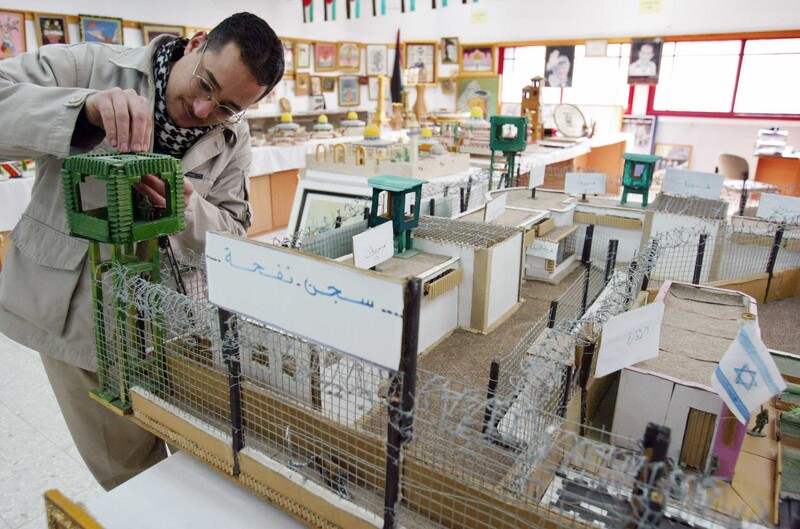The Electronic Intifada 19 July 2023

Palestinian prisoners constructed this model of the Israeli Nafha prison, which was on display in Gaza. Yusri Atiya al-Masri, 40, was imprisoned at Nafha for 20 years and developed thyroid cancer.
Newscom / SIPAYusri Atiya al-Masri will never forget the day he was transported from Nafha prison in southern Israel to Soroka hospital in Bir al-Saba.
The transport vehicle had metal seats, and Israeli prison guards sat on either side of him. He was in restraints, and the pain was so excruciating that he was uncertain if he would survive the trip.
For the past several years in prison, he had endured an undiagnosed debilitating illness, experiencing fainting episodes and severe weight loss.
Yet Israeli prison authorities withheld medical care until al-Masri’s fellow prisoners organized protests calling for his urgent treatment.
Finally, in January 2012, nearly nine years into his imprisonment, he was on his way to the hospital to receive a diagnosis and, hopefully, treatment.
“When I arrived at the hospital, my turn for examination by the doctor came after attending to the treatment of everyone else in the hospital,” he said. “I spent nights in a cell near the clinic.”
He was diagnosed with thyroid cancer and received no treatment besides painkillers until November 2013.
“It was a moment of triumph for me because I finally discovered the cause of my pain,” al-Masri said. “The prison doctor used to tell me that I was lying or imagining things and that my pain was due to psychological disorders.”
Twenty years in prison
Al-Masri, now 40, recollected all this during a phone interview with The Electronic Intifada at the end of June.
He had been released from prison only nine days prior, on 15 June 2023, after serving all 20 years of his sentence. A crowd of well-wishers and family greeted him when he arrived to his home in Deir al-Balah.
Al-Masri’s mother Sabita, 75, was also present at the celebration, hugging him.
“Each passing day, year after year, I persevere,” she said. Her son Yasser al-Masri died in June 2022 due to wounds inflicted during the May 2021 Israeli war on Gaza.
“My heartfelt message to all the mothers of prisoners is one of resilience and hope.”
Al-Masri was arrested on 10 June 2003, when Israeli forces conducted a nighttime raid of his family home in Deir al-Balah. He was 20 years old and a second-year English-language student at Al-Aqsa University.
For two months he was interrogated at Ashkelon prison about his alleged involvement with Islamic Jihad. He was subjected to physical and verbal abuse and described the interrogations as humiliating.
He was charged with being affiliated with Islamic Jihad and sentenced to 20 years in prison with five years of probation.
He would spend the next half of his life at Nafha prison, where he continued to pursue his education.
With the help of the International Committee of the Red Cross and the Palestinian Authority department of prisoners affairs, he obtained books on the history of Palestine and copied the texts by hand. He also borrowed books from other prisoners.
In 2015 al-Masri graduated with a degree in history, with a focus on Palestine. All the while, he continued to struggle with his newly diagnosed thyroid cancer.
Around that time, another prisoner, Maysara Abuhamdia, from the West Bank, died from throat cancer.
“This sparked protests in the prisons, as well as among human rights organizations, the Palestinian Authority and regulatory bodies within the prisons, [who were all] demanding treatment for me,” he said.
“A decision was made to remove my thyroid gland and administer radiation on my neck,” al-Masri stated. “However, I did not undergo any further treatments or examinations after that.”
Do not forget prisoners
Al-Masri is adjusting to life outside of prison. The outpouring of support has been massive and reassuring, and he has not stopped receiving visitors since his release.
Yet he must have a liver biopsy at the end of July, and he continues to struggle with elevated blood sugar levels and glandular dysfunction.
“I am awaiting the results of recent medical tests conducted in Gaza to assess my health status,” he said. “I hope not to return to suffering once again.”
He is determined to use his experiences and education to advocate for prisoners’ rights, with a focus on helping Palestinians in Israeli prisons receive better medical care and improved living conditions.
He wants to encourage Palestinians to pursue education, emphasizing it as a means to empowerment and resistance.
“The sick prisoner is nothing but a postponed funeral,” he said. “His death is imminent. I fear that the sick prisoner, the leader Walid Daqqa, will be the latest addition to the list of martyrs.”
Daqqa, 61, who has bone marrow cancer, has been imprisoned in Israel for 37 years, since March 1986, for allegedly participating in the armed resistance as a member of the Popular Front for the Liberation of Palestine.
Al-Masri has a message to the free people of the world: “Do not stop supporting the freedom of prisoners. Prisoners are alive but without life.”
Rajaa Salah is a journalist based in Gaza.





